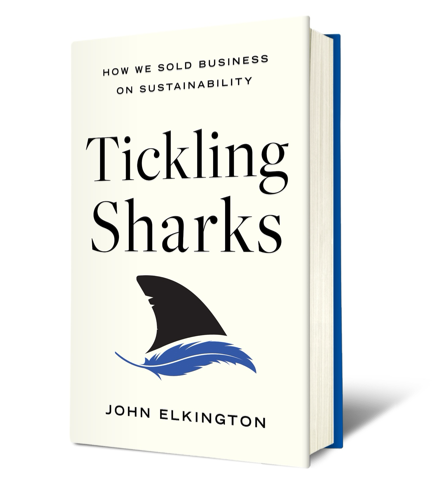Recharging Capitalism
How Zouk Capital rides market waves when investing in tomorrow's infrastructure
I am not, nor have I ever been, a venture capitalist. But I have long been fascinated by the role that the venture capital industry has played in the rise of innovation clusters like Silicon Valley and of new industries focusing on things like biotechnology, the internet, renewable energy and now even fusion power.
If I’m even half-way correct that the next 10 to 15 years will see more change in our economies than the last 50, during which I have been economically active, then venture funding will have an increasingly central role to play. The question, then, is which bits of the existing venture industry will gain traction—and which will flame out? And who will land in this opportunity space from out of the blue?
Harsh statistics
It takes grit and stamina to stay the course in this part of the market. The sector is known for its harsh economics, with a lot of losses outweighed (if you’re lucky or, even better, skilled) by a few breakthrough successes.
It’s perhaps relevant that of three venture funds that I have helped during this century, one (focused on promoting energy efficiency in supply chains and logistics) disappeared pretty much in a puff of smoke.
A second fund, Physic Ventures, was more aligned with my core interests, focusing on areas like healthcare, biotechnology, cleantech and lifestyles. To some degree its launch benefitted from Unilever’s difficulties in absorbing acquired values-driven companies like Ben & Jerry’s, where I had been involved in the original negotiations. Partly as a result, Unilever decided to contract out some of the early-stage engagements with entrepreneurial companies.
Sadly, a downturn squeezed Physic’s ability to achieve profitable exits from key investments, helping to sideline it, too.
Which leaves Samer Salty, CEO of Zouk Capital, as the last man standing among my original venturesome trio. With around 30 years of experience in the private equity, investment banking and technology sectors, he has spent the past 18 years building technology companies with sustainability at their core.
When we spoke recently, he noted that an important skill for any venture capitalist lies in the ability to distinguish between value and price. But the arrival of the internet, he reflected, “changed the world” —a process that has recently gone into overdrive with the (re)discovery of AI.
Longer term, the successful investor—Zouk now describes itself as a private equity house, rather than a venture capital firm—learns “how to be smart, which involves more than simply riding the latest tech wave.”
A ginormous bet
I joined the Zouk advisory board back in 2006 or 2007, alongside people like the extraordinary tech pioneer, Esther Dyson, and Nobel Prize-winner Professor Robert H. Grubbs—who in 2005 had been awarded the Nobel Prize in Chemistry alongside Yves Chauvin and Richard R. Schrock, for his work on organic synthesis.
Clearly, you can meet some fascinating people in the world of venture capital, whether the tide is going out or coming in.
Meanwhile, even if many other people are unhappy with the prospect of the incoming take two at a Trump Administration, one clear exception has been SoftBank CEO Masayoshi Son—who the President-elect said had committed to invest $100 billion in US companies.
Son’s ginormous bet on US industry is seen as his latest effort to position SoftBank—and himself—as the world’s leading tech investor after they were both forced to the sidelines in 2023. After being burned by the tech reset in 2022, SoftBank is now investing in startups heavily skewed toward AI.
For various reasons, 2024 has seen contrasting fortunes across the global venture investing landscape, a period characterized by both significant growth and uncertainty. The interplay between technological innovation and macroeconomic factors has powerfully shaped the sector, with a marked shift in favor of AI as the market potential of generative AI products increasingly evident.
Europe, meanwhile, continues to lag America, though the UK and Germany both continue to stand out as key contributors to Europe’s venture investment landscape. The UK’s technology ecosystem, particularly in London, remains vibrant with strong investments in fintech and AI. And it is in London that Zouk is based.
A digital climate tipping point
In terms of the firm’s size, Zouk currently manages around €800 million, including the £420 million Charging Infrastructure Investment Fund (CIIF), sponsored by the UK Government and focused on the public EV charging market in the UK.
So where, I asked, does all of this place Zouk in terms of the rankings of Climate and Sustainable European venture and private equity houses? Salty answers: “In the top 10 percent.”
Still, what has long marked out Zouk has been its focus on sustainability-related sectors—although others in the space include EQT, LGT Wealth Management and Generation Investment Management.
When I first joined Zouk’s advisory board, key areas of focus included the machine tools used to cut silicon for photovoltaic arrays, and then later came areas like waste management, recycling and recharging infrastructure for electric vehicles.
I ask Salty what their most successful investments have been to date. His reply: “The two key areas have been electric vehicle charging infrastructure and sustainable digital tech. That said, our success mainly comes from 18 years of learning from our early mistakes, avoiding pitfalls and focusing on growth investments at the right time.”
Today, Zouk’s twin focus areas are climate tech and sustainable infrastructure.
On the first, demand for climate tech solutions has been skyrocketing, Zouk says. Indeed, “the digital climate innovation has reached a tipping point, resulting in the emergence of scalable business models.” The firm’s aim here is to invest “in companies that are building the application layer of the net-zero economy. The fund is dedicated to supporting digital technology firms that are developing scalable solutions for climate change mitigation, adaptation, and the journey towards Net-Zero.”
On infrastructure, Zouk actively invests in and helps build and scale projects and companies in the environmental infrastructure and renewable energy sectors. “We prioritise investing in platforms rather than individual assets,” they say.
One key area in the energy sector is battery storage. “We are invested in the fastest growing battery storage optimiser in Europe,” Salty says. “Vienna-based Enspired utilizes AI to optimise power trading for renewable energy and battery storage assets, introducing a completely novel approach to the energy markets. Its AI algorithms can predict energy market fluctuations, balance supply and demand in real-time, and ensure more efficient asset utilisation, far surpassing the performance of traditional approaches.”
He continues:
The platform uses reinforcement learning, a sophisticated AI technique that optimises decision-making in highly complex, dynamic environments—underscoring Enspired’s position at the forefront of AI applications in the energy transition. In just one year, Enspired's AI algorithms have facilitated emission savings equivalent to over one million tonnes of CO2.
But the policy implications and “asks” along the way are likely to be profound. Someone is going to have do the system-level thinking and planning.
“The convergence of AI and climate tech extends to the very infrastructure, the AI infrastructure, that enables these applications,” Salty says, “as the demand for ‘compute’—and thus energy to power and cool down the servers, GPUs, and data centers—grows exponentially. If we are to continue to work toward a Net Zero goal, this AI infrastructure must be supported by a significant increase in clean energy capacity to ensure a sustainable growth path.”
Ecological restoration
Among other areas the Zouk team has been involved in have been the use of AI to manage the nature crisis and to help manage extreme weather events, and through its investment in Dendra Systems, ecological restoration. I have to say that I found this investment particularly interesting, but—even if we take a “living infrastructure” perspective—this one does seem a bit of a stretch for Zouk?
Salty replies: “Let’s take a closer look at Dendra. Founded in 2014 and based in Oxford, Dendra Systems employs over 80 dedicated professionals across the UK, Australia, UAE, and US. The company aims to restore nature, using high-resolution data capture and drone-based seeding, coupled with an AI-enabled ecosystem insights platform.”
He continues:
It is applying its technology and ecological expertise to enabling customers such as Rio Tinto, Glencore, Liontown, BHP, and the Abu Dhabi’s Environment Agency. Currently managing over 70,000 hectares, Dendra is setting standards in nature restoration, with application areas including mining, infrastructure, mangrove and arid ecosystem restoration.
By combining decades of research in ecology and land restoration with cutting-edge artificial intelligence trained on vast amount of data including detailed data gathered by high fidelity drone and satellite data gathering technology, Dendra is able to accelerate and scale up ecosystem rehabilitation, in response to erosion or mining degradation for example.
Traditional approaches to ecosystem restoration can't cope with huge scale; they're low tech, involving teams of ecologists taking small manual snapshots of tiny areas, with seeding being a cumbersome and often hazardous process. Successful restorations across arid, tropical and coastal environments, from desert ecosystems to mangrove forests, have positioned Dendra at the forefront of supporting biodiversity regeneration and rehabilitation programmes.
Embedded in everything
When I ask how Zouk’s embrace of such challenges is playing out, Salty replies: “Our original shift to the environment and to impact had nothing to do with being ahead of the market . Beyond caring about the environment, our thesis is that companies which are built on sustainable principals, will generate Alpha returns to investors. It took few years to validate this thesis but we are now able to generate the alpha consistently. ”
But even in this space, he points out, the “scale of the necessary solutions is getting constantly bigger. We are talking about investors now needing to find multiples of $100 million tickets.”
And when scale is the deciding factor, you must be very careful. “In many such areas China will always win the game, because it is now able to operate at such a scale.” Ultimately, Salty concludes, the relatively slow action to tackle the climate emergency will mean we are forced to adopt at least some forms of geoengineering. “Never say never,” is the way he puts it.
Stand far enough back and it seems likely that we are seeing the end of the beginning of a mainstream sustainability marketplace. The implication is that, rather than sustainability continuing as a “nice to have,” it will end up “embedded in everything.”
“Imagine a world,” Salty suggests, “where smart grids optimise renewable energy distribution, intelligent water systems ensure efficient resource management, and predictive models inform precise climate adaptation strategies. This is not a distant vision, but an emerging reality where artificial intelligence seamlessly integrates with climate technology and sustainable infrastructure to create a resilient, net zero future.”
Despite rapid recent rises in the energy consumption for data centers, he is optimistic—if we get our act together. As advancements in AI foundation models, battery technology, and edge computing progress, we are moving towards a future where AI computations are efficiently distributed between end devices like smartphones and the cloud, thereby reducing energy consumption.
At a time when many people are increasingly concerned about the growing energy and environmental footprints of the AI sector, Salty is upbeat: “Efficiency gains seen in models such as ChatGPT-4 similarly point towards an increasingly sustainable AI future,” he concludes. “By 2030, we envision a world where AI-powered climate solutions operate on highly efficient, low-carbon infrastructure, with computational tasks shared between increasingly capable local devices and environmentally friendly cloud platforms.”
This world of exponential solutions is one I explore in my book Green Swans, published back in 2020. And observing the evolution of Zouk and others in the field has helped give me confidence that, despite all the ups and downs, the ins and outs, the outlines of a better future are beginning to emerge from the rubble and debris of the old, collapsing system.
John Elkington is Founder & Chief Pollinator at Volans. His personal website can be accessed here.
Available on Amazon and through good bookshops.
What readers say:
“By coaching the enlightened—and confronting the laggards—John has helped put the issues and opportunities firmly on the top tables of some of the world’s largest and most impactful businesses.”
SIR DAVE LEWIS, former CEO, Tesco PLC; chair, WWF-UK







